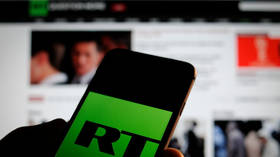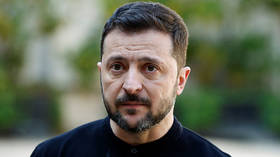EU ban on RT and Sputnik has failed – media

Luxembourg’s Tageblatt newspaper has called for tighter restrictions across the bloc on access to RT and Sputnik, citing the failure of the Western narrative on Ukraine to resonate with audiences. He further admitted that ‘pro-Russian narratives’ are increasingly popular with audiences in the EU.
Less than a week after Russian troops entered Ukraine last year, the European Commission announced sanctions on RT and Sputnik, suspending their TV broadcasting licenses and blocking both websites for readers across the EU.
Just as 11 rounds of sanctions failed to crater the Russian economy, the crackdown on RT and Sputnik “promised a lot and delivered little,” Tageblatt editor-in-chief Tobias Senzig wrote in an editorial on Monday.
“With just a few tricks – a simple change in the network settings of your computer is enough – you can easily access the RT and Sputnik websites,” he griped, referring to the fact that RT remains accessible to readers using a VPN, the Tor browser, or the Psiphon censorship-bypass tool.
Although Senzig argued that free access to information is one of the “grassroots democratic principles that the internet rightly upholds,” he called the EU’s sanctions “long overdue.” RT and Sputnik are not “public broadcasters,” he claimed, but “pure offshoots of the Kremlin's propaganda department.”
“Not only are they trying to represent the ‘Moscow view’ to the rest of the world, but they are also aggressively interfering in intra-European affairs,” he elaborated. “Our democracies are portrayed as broken and dysfunctional, and Moscow's antagonists are constantly being attacked: Social Democrats, Greens, ‘do-gooders’, Brussels, Ukraine.”
Moscow argues that the Western media outlets are working in lockstep with Western governments against Russia. These outlets “receive instructions and manuals from their special services, they get leaks of information – which are mostly, very often, specially and professionally prepared falsehoods – and do this round the clock,” Kremlin spokesman Dmitry Peskov said in August. Russia has set out to compete with them “very gingerly, but quite successfully,” he added.
RT is “laughing up its sleeve,” Senzig declared, noting that according to a study published by German think tank Cemas last November, “approval ratings for pro-Russian conspiracy narratives surrounding the Ukraine war have increased ‘significantly’ among the overall German population since April 2022."
“In other words,” he explained, “more people in Germany believed Putin's lies after the attack than before the war.”
Senzig is not the first pundit or official to decry the apparent power of RT. The commander of United States Southern Command Gen. Laura Richardson, complained last month that the US is losing the “conflict in the information domain” to RT, Sputnik, and TeleSUR in Latin America.














